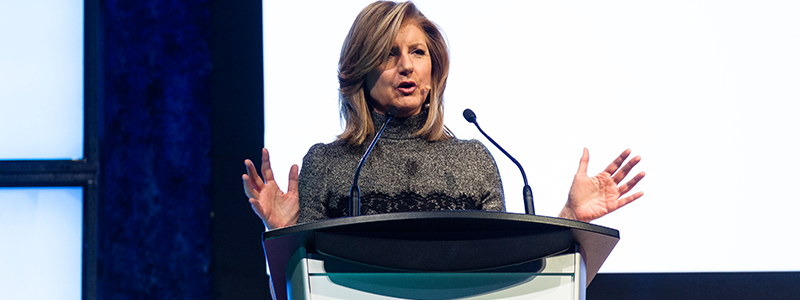

Sleep is not optional, Arianna Huffington, Pulitzer Prize winner and founder of The Huffington Post and Thrive Global, told guests at Dinner with Scientists, presented by PearTree Financial, the annual marquee fundraising event in support of research at the Lunenfeld-Tanenbaum Research Institute, part of Sinai Health System. At the event, Arianna spoke about the importance of sleep and how lack of sleep affects our health, which she discovered while working on her latest book The Sleep Revolution: Transforming Your Life, One Night at a Time.
According to Arianna, sleep is often sacrificed in the name of productivity. But though we often think of sleep as “wasted” time, for the brain it is actually a time of frenetic and essential activity. When we’re asleep, the brain cleans up all the toxins that have accumulated throughout the day, and if that doesn’t happen — because our sleep is frequently disturbed, or we don’t get enough sleep — it can have consequences for our short and long term memory and our overall health. In fact, sleep deprivation is linked to high blood pressure, diabetes, cancer, Alzheimer’s disease, depression and anxiety.
For optimal health, the vast majority of adults require seven to nine hours of sleep daily. Within that range, the amount varies from person to person.
We sat down with Arianna to learn what each of us can do to ensure we get the most restful, restorative sleep possible every night. Here’s what she recommends.
1. Create a transition to sleep. Parents naturally create rituals and routines around putting their children to bed — taking a bath, reading a story, singing a lullaby — that signal to the body and brain that it is time to go to sleep. As adults we tend to do away with those transitions to sleep, but they are just as necessary for the adult brain as they are for children’s brains. Instead of going full steam until dropping into bed, try creating your own rituals that give your body and mind time to slow down and prepare for sleep. Your ritual could be as long as half an hour or as brief as five minutes, but doing it every night before bed will help train your body and brain that it’s time to go to sleep.
2. Turn off all devices and charge them outside of your bedroom. Teenagers and adults alike are increasingly addicted to their smartphones and other devices, and we are often texting, on social media, responding to email or surfing the web until right before closing our eyes for sleep. And because many of us sleep with our devices right beside our beds, it is common for devices to disrupt our sleep with lights and sounds. Turning off your devices as part of your nighttime ritual is key, and putting your devices “to sleep” outside of your bedroom will prevent them from disrupting your sleep and help stem the urge to reach for them during the night.
3. Create an environment conducive to sleep. It is also important to create the physical sleeping conditions that are most conducive to a restful sleep. Make sure your bedroom is as dark as possible with no outside or blinking lights penetrating the darkness. And keep your bedroom between 18 to 20.5 degrees to avoid overheating during the night. These simple changes to your sleep environment can make a huge difference in the quality of your sleep.